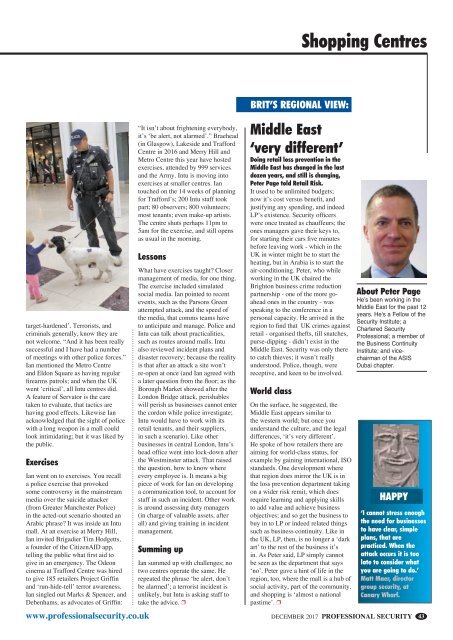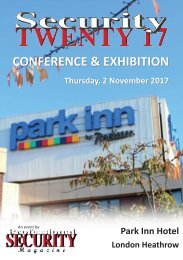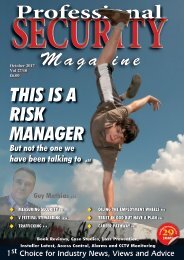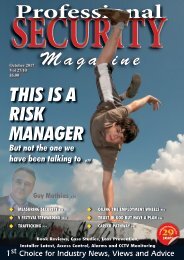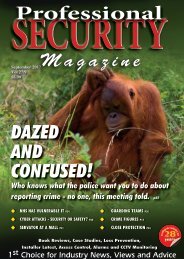Draft27-12
You also want an ePaper? Increase the reach of your titles
YUMPU automatically turns print PDFs into web optimized ePapers that Google loves.
Shopping Centres<br />
target-hardened’. Terrorists, and<br />
criminals generally, know they are<br />
not welcome. “And it has been really<br />
successful and I have had a number<br />
of meetings with other police forces.”<br />
Ian mentioned the Metro Centre<br />
and Eldon Square as having regular<br />
firearms patrols; and when the UK<br />
went ‘critical’, all Intu centres did.<br />
A feature of Servator is the care<br />
taken to evaluate, that tactics are<br />
having good effects. Likewise Ian<br />
acknowledged that the sight of police<br />
with a long weapon in a mall could<br />
look intimidating; but it was liked by<br />
the public.<br />
Exercises<br />
Ian went on to exercises. You recall<br />
a police exercise that provoked<br />
some controversy in the mainstream<br />
media over the suicide attacker<br />
(from Greater Manchester Police)<br />
in the acted-out scenario shouted an<br />
Arabic phrase? It was inside an Intu<br />
mall. At an exercise at Merry Hill,<br />
Ian invited Brigadier Tim Hodgetts,<br />
a founder of the CitizenAID app,<br />
telling the public what first aid to<br />
give in an emergency. The Odeon<br />
cinema at Trafford Centre was hired<br />
to give 185 retailers Project Griffin<br />
and ‘run-hide-tell’ terror awareness.<br />
Ian singled out Marks & Spencer, and<br />
Debenhams, as advocates of Griffin:<br />
“It isn’t about frightening everybody,<br />
it’s ‘be alert, not alarmed’.” Braehead<br />
(in Glasgow), Lakeside and Trafford<br />
Centre in 2016 and Merry Hill and<br />
Metro Centre this year have hosted<br />
exercises, attended by 999 services<br />
and the Army. Intu is moving into<br />
exercises at smaller centres. Ian<br />
touched on the 14 weeks of planning<br />
for Trafford’s; 200 Intu staff took<br />
part; 80 observers; 800 volunteers;<br />
most tenants; even make-up artists.<br />
The centre shuts perhaps 11pm to<br />
5am for the exercise, and still opens<br />
as usual in the morning.<br />
Lessons<br />
What have exercises taught? Closer<br />
management of media, for one thing.<br />
The exercise included simulated<br />
social media. Ian pointed to recent<br />
events, such as the Parsons Green<br />
attempted attack, and the speed of<br />
the media, that comms teams have<br />
to anticipate and manage. Police and<br />
Intu can talk about practicalities,<br />
such as routes around malls. Intu<br />
also reviewed incident plans and<br />
disaster recovery; because the reality<br />
is that after an attack a site won’t<br />
re-open at once (and Ian agreed with<br />
a later question from the floor; as the<br />
Borough Market showed after the<br />
London Bridge attack, perishables<br />
will perish as businesses cannot enter<br />
the cordon while police investigate;<br />
Intu would have to work with its<br />
retail tenants, and their suppliers,<br />
in such a scenario). Like other<br />
businesses in central London, Intu’s<br />
head office went into lock-down after<br />
the Westminster attack. That raised<br />
the question, how to know where<br />
every employee is. It means a big<br />
piece of work for Ian on developing<br />
a communication tool, to account for<br />
staff in such an incident. Other work<br />
is around assessing duty managers<br />
(in charge of valuable assets, after<br />
all) and giving training in incident<br />
management.<br />
Summing up<br />
Ian summed up with challenges; no<br />
two centres operate the same. He<br />
repeated the phrase ‘be alert, don’t<br />
be alarmed’; a terrorist incident is<br />
unlikely, but Intu is asking staff to<br />
take the advice. p<br />
brit’s regional view:<br />
Middle East<br />
‘very different’<br />
Doing retail loss prevention in the<br />
Middle East has changed in the last<br />
dozen years, and still is changing,<br />
Peter Page told Retail Risk.<br />
It used to be unlimited budgets;<br />
now it’s cost versus benefit, and<br />
justifying any spending, and indeed<br />
LP’s existence. Security officers<br />
were once treated as chauffeurs; the<br />
ones managers gave their keys to,<br />
for starting their cars five minutes<br />
before leaving work - which in the<br />
UK in winter might be to start the<br />
heating, but in Arabia is to start the<br />
air-conditioning. Peter, who while<br />
working in the UK chaired the<br />
Brighton business crime reduction<br />
partnership - one of the more goahead<br />
ones in the country - was<br />
speaking to the conference in a<br />
personal capacity. He arrived in the<br />
region to find that UK crimes against<br />
retail - organised thefts, till snatches,<br />
purse-dipping - didn’t exist in the<br />
Middle East. Security was only there<br />
to catch thieves; it wasn’t really<br />
understood. Police, though, were<br />
receptive, and keen to be involved.<br />
World class<br />
On the surface, he suggested, the<br />
Middle East appears similar to<br />
the western world; but once you<br />
understand the culture, and the legal<br />
differences, ‘it’s very different’.<br />
He spoke of how retailers there are<br />
aiming for world-class status, for<br />
example by gaining international, ISO<br />
standards. One development where<br />
that region does mirror the UK is in<br />
the loss prevention department taking<br />
on a wider risk remit, which does<br />
require learning and applying skills<br />
to add value and achieve business<br />
objectives; and so get the business to<br />
buy in to LP or indeed related things<br />
such as business continuity. Like in<br />
the UK, LP, then, is no longer a ‘dark<br />
art’ to the rest of the business it’s<br />
in. As Peter said, LP simply cannot<br />
be seen as the department that says<br />
‘no’. Peter gave a hint of life in the<br />
region, too, where the mall is a hub of<br />
social activity, part of the community,<br />
and shopping is ‘almost a national<br />
pastime’. p<br />
About Peter Page<br />
He’s been working in the<br />
Middle East for the past <strong>12</strong><br />
years. He’s a Fellow of the<br />
Security Institute; a<br />
Chartered Security<br />
Professional; a member of<br />
the Business Continuity<br />
Institute; and vicechairman<br />
of the ASIS<br />
Dubai chapter.<br />
HAPPY<br />
‘I cannot stress enough<br />
the need for businesses<br />
to have clear, simple<br />
plans, that are<br />
practiced. When the<br />
attack occurs it is too<br />
late to consider what<br />
you are going to do.’<br />
Matt Maer, director<br />
group security, at<br />
Canary Wharf.<br />
www.professionalsecurity.co.uk DECEMBER 2017 PROFESSIONAL SECURITY 43<br />
p42,3 shopping 27-<strong>12</strong>.indd 2 18/11/2017 11:45


